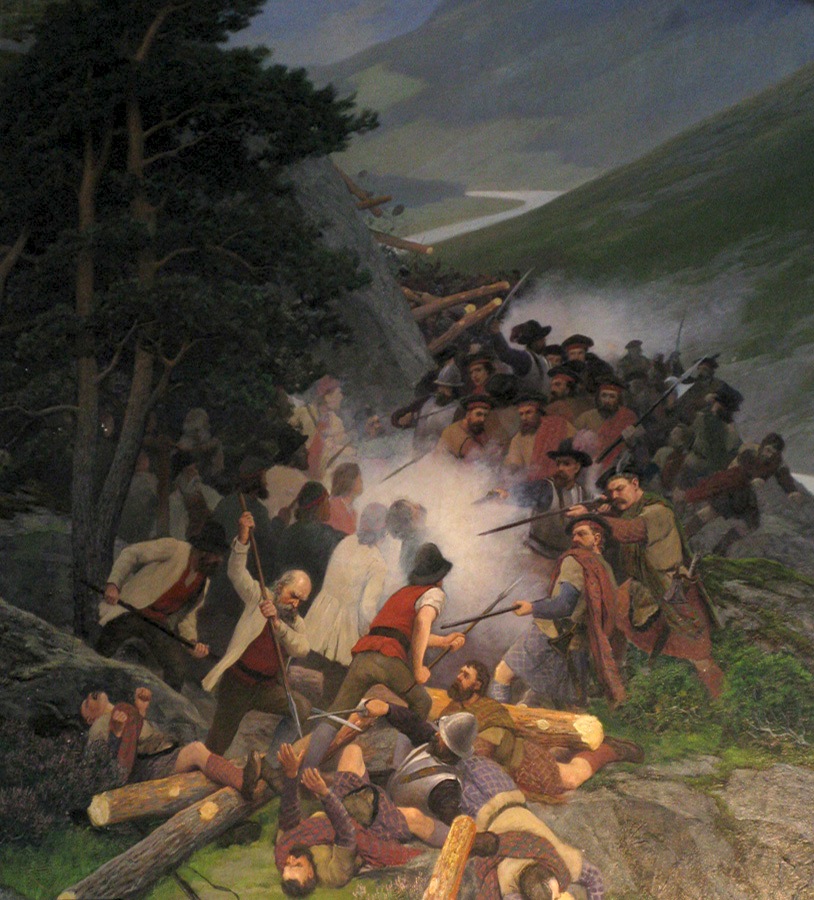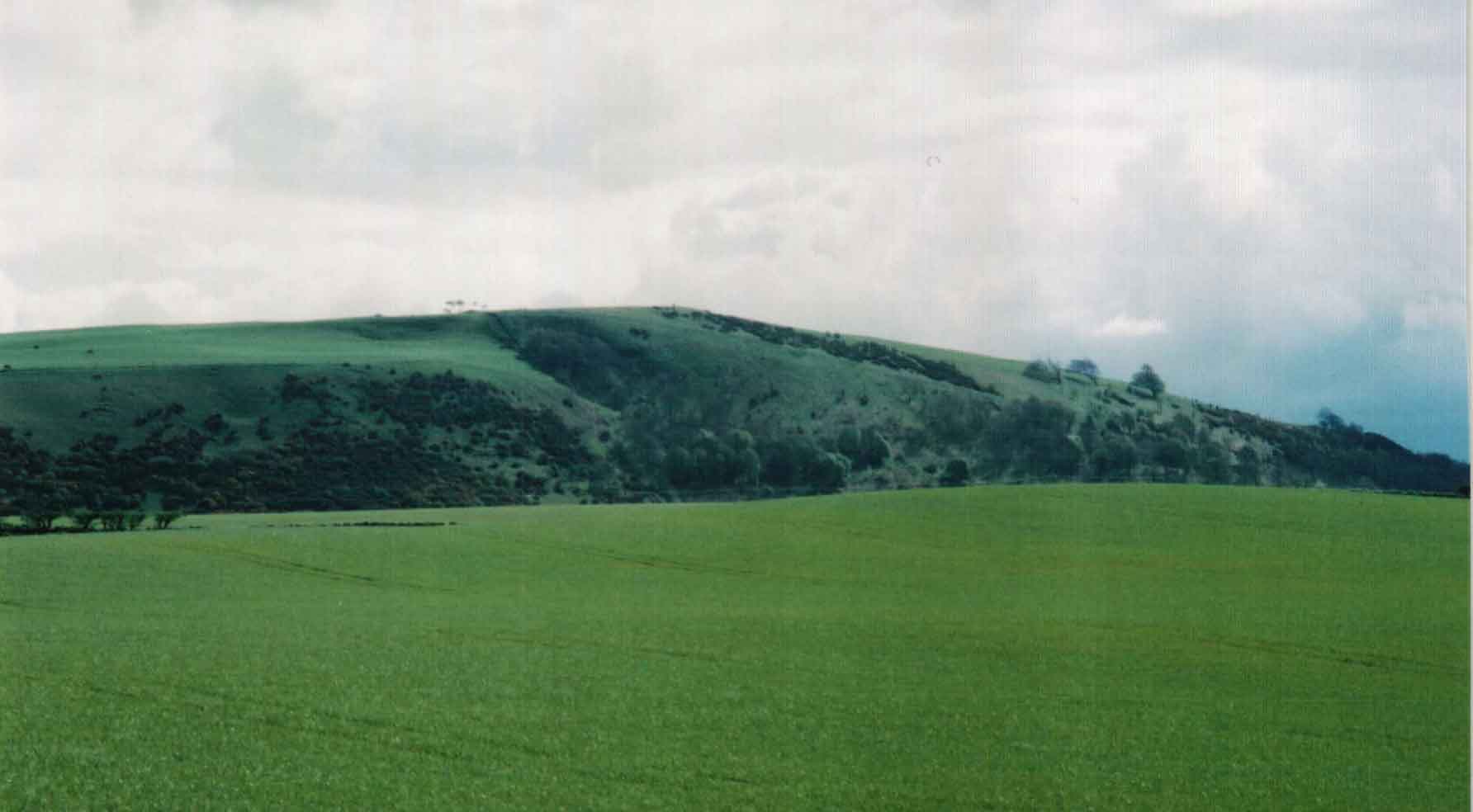Scottish Military Disasters
How did you come to write this book?
I used to be a journalist. I was doing some research for a magazine article about some battles involving Scottish troops and I noticed that the times when things went wrong were often ignored in many mainstream histories or dismissed in a sentence. I found myself wanting to know more and the more I found out the more fascinated I became.
Some bonus material for those of you who bought the book: illustrations which were not used. Press this button - Battle Maps - to see the maps specially prepared for the book but ultimately not included.

The Norwegians and Scots get to grips with each other in this perhaps
rather fanciful portrayal of the Battle of Kringen in 1612. Chapter 6.

The Scots Army left a strong position on Doon Hill to fight and suffered a humiliating defeat at
the hands of the English under Oliver Cromwell in 1650. Chapter 7.

Around 3,000 Scots captured at Dunbar were imprisoned in Durham Cathedral. More than of them died in captivity and the survivors were sold into slavery or to the French Army.
I don't know how many memoirs there are from the First World War written by Germans. But I'd be interested to see what they have to say about killing prisoners. I've just finished reading a book, first published in 1929, in which a variety of British servicemen recounted their experiences during the war. What struck me was that more than half of accounts mentioning the murder of surrendered or surrendering Germans were from former members of Highland regiments.
One account detailed how during the Battle of Loos in 1915 a platoon of Highlanders found about 20 Germans at their mercy in a captured trench. The Germans, who wounded some of the Highlanders as they stormed the trench, begged for mercy. Then one of the Scots shouted “Remember the Lusitania” and the Germans were slaughtered. The deaths of almost 1,200 civilians when a German submarine torpedoed the ocean liner were widely regarded at the time as a war crime. Another member of a Highland regiment told how that no German was left alive after his unit took a German trench at Ypres in 1917. In another book, a private in the one of the Highland regiments also recalled the murder of prisoners at Loos.
Now, it could be that Scottish soldiers were more honest about whether they killed surrendered Germans. Or it could be that they were more likely to kill prisoners than most other British soldiers? The Canadians and Australians were also notorious for killing Germans who could have been easily captured.
About a year ago, while working on a companion volume to Scottish Military Disasters, I was going through some battalion histories from the First World War. Most did not explicitly mention the killing of surrendering Germans but simply noted with satisfaction that there were no survivors from such-and -such a German machinegun post after had been over-run. But the history of one of the Glasgow battalions was not so coy. The history tells the story of an officer of the Worcestershire Regiment who asked a sergeant from the Glasgow unit how many German prisoners he’d taken during a recent battle. “Prisoners,” replied the sergeant. “None, my ammunition's no done yet.”
The Scots who fought in the Second World War were just as honest as those from the First when it came to talking about killing prisoners. Seaforth Highlander Sgt. Carnduff said that after the Battle of Alamein a total of nine Germans found huddled in the bottom of trenches by-passed during the 51st Highland Division’s advance had been killed by dropping anti-tank mines on them. A soldier from the 15th Scottish Division admitted that during the fighting in Normandy after D-Day his unit soon stopped taking prisoners. “Any German who tries to surrender is a brave man; we just shoot them then and there, with their hands up,” he said. “There’s nothing to choose between the British and the Germans as regards atrocities …” The soldier added that shortly after landing in France, his Sergeant Major had been relieving some Germans of their valuables when a Canadian soldier sprayed the prisoners with his sten gun. The Sergeant Major was hit in the stomach.
1. Mons Graupius - 84 AD - The first recorded battle in Scottish history. Also the first recorded military disaster.
2. Falkirk - 1298 -William Wallace’s brief day in the sun is ended when he comes up against Edward, the Hammer of the Scots.
The Challenge
OK, gentle visitor, I have a challenge for you. Can anyone out there cite a German source for the claim that during the First World War the kilties were known as the “Ladies from Hell” ? I’ve got a feeling this name might just be the products of the British propaganda bureau or over-imaginative journalism. I have come across a German nickname for the kilties but it does not convey the respect or awe suggested by the above. I think for that reason, what I found rings truer. Very few troops are given respectful nicknames by their foes. It's funny how fictions can become accepted as truth through constant repetition. Many people believe that Berwick upon Tweed was still at war with Russia until the 1960s. The story went that the declaration of war against Russia when the Crimean War broke-out in 1853 included Berwick as a separate entity because it's status was still in dispute; the Scots claiming in the 1707 Treaty of Union it was annexed territory and refusing to recognise it as part of England. When the peace was signed in 1856, Berwick was not mentioned. Sadly, not true. A 1746 Act of Parliament declared Berwick officially part of England. The Crimean War claim was first made shortly before the First World War. It was even said, wrongly again, that the Soviets signed a "peace treaty" with Berwick in 1966 to rectify the omission.
The Conclusion
Risking the Wrath
OK, I’m going to risk the wrath of the old soldiers, the really old soldiers, and proclaim that I don’t believe the Germans ever dubbed the Highland regiments during the First World War "The Ladies from the Hell". I haven’t been able to find anyone who has come up a German source for this claim. Maybe, perhaps, a snivelling German prisoner trying to curry favour with his kilted captors sold them a pup along the lines of Ladies from Hell; but I doubt even that. Soldiers just don’t give their opponents respectful nicknames. The tenacious teenage Germans who opposed the three Scottish infantry divisions in northwest Europe after D-Day were dubbed “Those Bloody Para Boys” which may or may not have been intended as a grudging compliment. Previous attempts to debunk the "Ladies from Hell" have led to an outraged backlash from Second World War veterans of the Highland regiments. I can't say why that would be. While I was quizzing folk who I thought might know where the Ladies from Hell story might have originated, someone said they also doubted if the 51st Highland Division really topped a First World War German list of “Most to be Feared” units. As two other Scottish divisions, the 9th and 15th, had excellent records, I think my informant might have a point. Veterans don’t always know best. Those who dared to suggest the Scots Guards had massacred civilians in Malaya in 1948 were shouted down and ridiculed. And yet the High Court in London ruled recently that there was plenty of evidence that the massacre at Batang Kali did take place. All too often the reported response from veterans to less than glowing eulogies to the Scottish soldier is knee-jerk. Those who insist on re-writing history tend to miss out on the chance to learn from past experience.
Online
We have 206 guests and no members online

